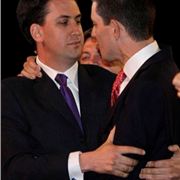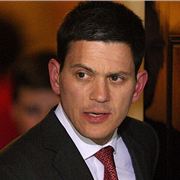This Wednesday’s political meeting in Manchester City Centre was packed.
Politics is about “empathy, analysis, vision, policy and implementation”. Labour’s greatest mistake was that they "mistook good times for a good system
160 people turned out on a wet Wednesday and paid £10 - £2 more than a recent appearance by Jarvis Cocker - to see David Miliband, the nearly-leader of the Labour Party, in conversation with Dave Haslam.
It's intriguing to learn that the ex-Hacienda DJ, now writer and commentator, is three years older than the man who might have been, and still might be, our next prime minister.

David Miliband knows Manchester well, but it can't all be happy memories. It was here during the Labour Party Conference of 2010 were he famously lost to his brother in the leadership election. It was both a narrow defeat and a surprising one.
If this were a Greek tragedy David would have been plotting his brother’s downfall from day one of his defeat.
If it were a soap opera, David would have been drinking himself to an early grave.
But this is British politics and things are more low key.
Instead there’s clear evidence of DM making the best of an unplanned defeat, taking time for both family and reflection, and returning to the political fray ready to make a contribution in whichever way seems most appropriate. All very pleasant indeed.
The choice of Dave Haslam as questioner is inspired. Alternative and knowledgeable, supportive yet cynical, his mix of questions ensures that the evening is neither a bland ritual nor a simple call to arms. It’s even occasionally inspirational. Miliband is well-known as an intellectual with social skills. He respects people, respects ideas, and conveys this warmly and clearly.
The evening starts and ends with the tricky questions: Haslam’s first question about David’s relationship with his brother, and an audience question about whether he will run for the leadership again.
Miliband’s non-committal on the latter, and clear on the former. He claims familial feelings of unity, pride and looking forward dominated the moment when his younger brother’s triumph was made public.
The step backwards from the front bench now seems a genuine choice for the right reasons.
As well as removing himself from the gaze of a press ever searching for splits, the break has given him family time as well as the “space to think, reflect and to do politics in a different way”.
He’s still strongly committed to the organisation ‘Movement for Change’ which seeks, not without its critics, to turn the Labour Party into a more friendly outward-looking organisation. Some would say it’s the policitcal equivalent of 'happy clappy’ religious movements.
There’s room for doubt. David has a logical, analytical approach to issues, even those which can arouse passion.
Take torture. Haslam asks questions about the British role in ‘extraordinary rendition’. Miliband was once Foreign Secretary. Are we culpable?
"The most important roles of any politician in power," says Miliband, "are to protect the security of its citizens and to protect the nation’s values. The most difficult decisions arise when those two come into conflict. The question on torture is clear: we are against it. The difficult decisions arise when that opposition finds itself in conflict with the aim of protecting security."
Miliband follows this with a clear analysis of the distinction between rendition and extraordinary rendition and a statement about the UK ’s unwitting and unplanned minimal involvement.

He’s also sharp on failure and success. Labour cannot win unless it understands and respects the reasons lots of people voted against the party in the last election, and can put forward clear ideas for the future.
Politics is about “empathy, analysis, vision, policy and implementation”. Labour’s greatest mistake was that they "mistook good times for a good system" and failed to have a good insulation policy.
Not all the audience are Labour Party members, or even necessarily supporters, but there’s clear respect for a man of ability who’s faced a surprise defeat and worked hard to continue to make his contribution.
Manchester City Centre ward, home to fights for democracy during the Peterloo Massacre and the scene of suffragette protests, is criticised as having one of the lowest local turnouts in elections. But on this occasion newly elected city centre Labour councillor, Kevin Peel, in organising the event ensured a fascinating evening’s discussion, led by Dave Haslam - and it attracted a great turnout.











